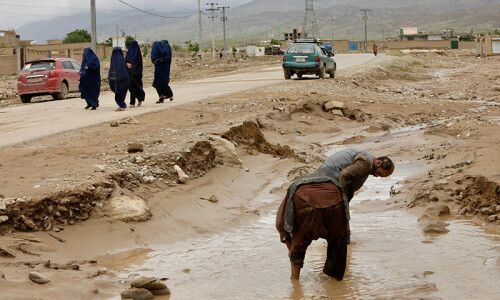ISLAMABAD: The Khyber Pakhtunkhwa government defended parliament in the Supreme Court on Thursday and said when it amended the constitution, it exercised constituent power and not legislative.
Senior counsel Iftikhar Gillani, appearing on behalf of the KP government, argued before a 17-judge full court hearing challenges to the 18th and 21st amendments that being a supreme body, the parliament even had the authority to abrogate the constitution.
“If a new constitution has to be brought in, the old one has to be abrogated,” the counsel said when Justice Sheikh Azmat Saeed asked whether parliament could abrogate or repeal the constitution.
Take a look: Why is a parallel system necessary to fight terror, asks SC
Mr Gillani was defending the 18th Amendment under which the name of the province was changed from NWFP to Khyber Pakhtunkhwa. He emphasised that the word KP neither denoted race nor ethnicity but only manifested the identity of the people.
“The amendment to Article 1(2) by renaming the province as KP is in complete harmony with the letter and spirit of the constitution,” the counsel said, adding that it was for the parliament representing the people of Pakistan, and not the judiciary, to impose limitation on its own amending power.
He said there were 32 constitutions in the world where the basic structure of the constitution had been defined and laid down with precision in the document itself.
“The framers of our constitution could have imposed more and absolute limitation, if they so desired, on the power of amendment of the parliament in addition to the one as expressed in Article 239(4) of the Constitution,” he said.
The counsel recalled that the Supreme Court had in at least two cases — Wukla Mahaz and Pakistan Lawyers Forum — cautioned by holding that courts should not attempt to define and lay down with precision the basic structure of the constitution.
Once an amendment was made, he argued, it became an integral part of the constitution and all its provisions enjoyed equal status. Therefore, the chapter which contains the fundamental rights has no primacy or superiority to any other provision of the constitution. But if the court thought otherwise, it would have to revisit these two judgments, he argued.
Mr Gillani said he did not find the most-cited case law from the Indian jurisdiction 1973 Kasavananda Bharti under which the doctrine of basic structure was evolved as of great significance.
But Justice Ejaz Afzal observed that the fundamental rights were inborn, inherent and inalienable which the constitution simply guaranteed. “How these rights can be taken away or abridged in the name of the constitutional amendment,” he wondered.
But the counsel said if the court believed that the fundamental rights could not be taken away then it would have to revisit the earlier cited two judgments, adding that a constitutional amendment was not an ordinary law, but an amendment.
It is for the parliament and, not the court, to bring changes to the constitution and it is for the people to decide which kind of system they want.
When the counsel’s attention was drawn to the difficulty being faced by the minorities in the electioneering system, Justice Asif Saeed Khosa referred to Article 51 of the Constitution which allowed non-Muslims and women to contest for both general and reserved seats.
“The special seat is an additional privilege given to the minorities, women or disadvantaged sections of society to participate in the elections – an advantage which is not available to Muslims,” Justice Khosa observed.
This reflected large-heartedness of the parliament as it had given due respect to the minorities and other disadvantaged people, he said.
Published in Dawn, May 29th, 2015
On a mobile phone? Get the Dawn Mobile App: Apple Store | Google Play













































